As various communities grapple with the aftermath of these environmental impacts, the discourse around corporate accountability grows ever more pressing.
Whistleblower Exposes Ecopetrol's Extensive Pollution Practices

Whistleblower Exposes Ecopetrol's Extensive Pollution Practices
Revelations from a former Ecopetrol employee highlight extensive oil spills and environmental damage caused by Colombia's national oil company.
Ecopetrol, Colombia's national oil company, has come under fire following explosive revelations from a whistleblower that indicate extensive pollution across hundreds of sites. An investigation by the BBC has unveiled a trove of data revealing over 800 reported instances of oil contamination between 1989 and 2018, with claims that nearly 20% of these went unreported. The environmental travesty raises alarms, especially concerning the impact on the biodiverse regions surrounding Barrancabermeja, notably the Magdalena River, a critical water source for millions.
The former employee, Andrés Olarte, who worked as an adviser to Ecopetrol's CEO, realized the company's failures soon after joining the firm in 2017. He challenged the management regarding what he termed “awful” pollution data but faced dismissal. Upon leaving in 2019, he shared extensive documentation with the Environmental Investigation Agency and subsequently with the BBC, supporting claims of deep-seated pollution and cover-up practices.
The situation is particularly dire for local ecosystems, as community fishermen, including Yuly Velásquez, have reported an alarming incidence of dead aquatic life, underscoring the detrimental effects of oil spills. While Ecopetrol maintains it conducts operations under Colombian law with an emphasis on sustainability, the reality reflects a different narrative.
Further complicating the situation, local environmental advocates have received threats, with Ekopetrol's former CEO Felipe Bayón categorically denying any misconduct regarding these intimidation tactics. Critics argue, however, that links between private security contractors and former paramilitary groups contribute to an unsafe environment for whistleblowers and activists alike.
Despite the outcry, the company's recent operational data indicates ongoing pollution concerns, including hundreds of oil spills reported since 2020. Environmental experts are calling for immediate action, emphasizing the link between industrial pollution and wildlife degradation as critical issues Colombia must confront.
The fight for accountability in Ecopetrol's practices continues, highlighted by communities advocating for their rights against environmental degradation and threats to their livelihoods. As Olarte submits complaints and legal challenges in defense of his community and environment, he remains steadfast in his commitment to ecological preservation, a stance shared by fellow environmental defenders, despite the risks involved. With the ongoing armed conflicts and environmental challenges, the future remains uncertain for those living in the shadows of Colombia's oil industry.
The former employee, Andrés Olarte, who worked as an adviser to Ecopetrol's CEO, realized the company's failures soon after joining the firm in 2017. He challenged the management regarding what he termed “awful” pollution data but faced dismissal. Upon leaving in 2019, he shared extensive documentation with the Environmental Investigation Agency and subsequently with the BBC, supporting claims of deep-seated pollution and cover-up practices.
The situation is particularly dire for local ecosystems, as community fishermen, including Yuly Velásquez, have reported an alarming incidence of dead aquatic life, underscoring the detrimental effects of oil spills. While Ecopetrol maintains it conducts operations under Colombian law with an emphasis on sustainability, the reality reflects a different narrative.
Further complicating the situation, local environmental advocates have received threats, with Ekopetrol's former CEO Felipe Bayón categorically denying any misconduct regarding these intimidation tactics. Critics argue, however, that links between private security contractors and former paramilitary groups contribute to an unsafe environment for whistleblowers and activists alike.
Despite the outcry, the company's recent operational data indicates ongoing pollution concerns, including hundreds of oil spills reported since 2020. Environmental experts are calling for immediate action, emphasizing the link between industrial pollution and wildlife degradation as critical issues Colombia must confront.
The fight for accountability in Ecopetrol's practices continues, highlighted by communities advocating for their rights against environmental degradation and threats to their livelihoods. As Olarte submits complaints and legal challenges in defense of his community and environment, he remains steadfast in his commitment to ecological preservation, a stance shared by fellow environmental defenders, despite the risks involved. With the ongoing armed conflicts and environmental challenges, the future remains uncertain for those living in the shadows of Colombia's oil industry.






















